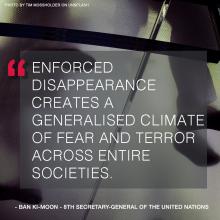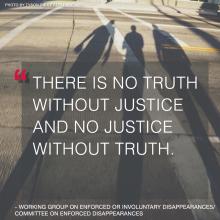 Today is the International Day of the Disappeared; a day that marks the countless victims of state-sponsored enforced disappearances around the world.
Today is the International Day of the Disappeared; a day that marks the countless victims of state-sponsored enforced disappearances around the world.
No country has such a terrifying network of systems designed to disappear critics today as China.
This year a large coalition of NGOs around the world is using the International Day of the Disappeared to throw the spotlight on Beijing and its practice of mass disappearances. Read the joint statement here.
China’s emerging and growing ecosystem for disappearances is a modern update on the totalitarian approach of the past. It has thrived and expanded to an unprecedented scale because the world has largely ignored these gross human rights abuses. To learn more of what enforced disappearances are, and how the UN system can be used to bring justice for its victims, see
Residential Surveillance at a Designated Location (RSDL): run by the police or state security; victims kept in incommunicado detention at non-disclosed locations, high incidence of torture and mistreatment, usually for six months; legalized in 2012.
Main targets have been human rights lawyers, activists, NGO workers and religious leaders. After a review submitted by Safeguard Defenders, ISHR and others in 2018 (can be downloaded here), 10 different UN bodies called for it to be abolished.
“…we are crossing the mountains. If you want to come back alive, you should think well about what you tell us.” I answered that I understood.” – Jiang Xiaoyu, IT worker and rights defender describes how one police officer threatened him when he was kidnapped into RSDL in 2015.
To learn more about what it means to be a victim of RSDL (including Jiang’s story), see Safeguard Defenders critically acclaimed book, The People’s Republic of the Disappeared, available on Amazon worldwide. Safeguard Defenders have also released a brief report on the use of solitary confinement as a method of torture inside RSDL, downloadable here.
Liuzhi: run by the fearsome National Supervision Commission (NSC); similar set up to RSDL except completely outside judicial system; legalized in 2018.
Main targets are corruption suspects who are Communist Party members or state workers, but can also include anyone who is connected to an investigation.
“I was detained in many different places… I was detained in a hotel, in a Party school, in the “clean government education center,” and other buildings”. – Victim of shuanggui (precursor to liuzhi).
The system, little known, is the subject of a new comprehensive review filed to several different UN bodies on the International Day of the Disappeared (can be downloaded here).
Xinjiang Re-education Camps: run by the regional Xinjiang government with cooperation of police and hired security; reports first emerged in 2017; never legalized. Main targets are ethnic Uighurs and Kazaks, estimates of 1 – 3 million imprisoned.
“We weren't allowed to meet with relatives. But once a week we were allowed to make a call for five minutes during which we were not allowed to say anything bad about our situation or else your line would be cut. And police offices are standing right next to you.” Human Rights Watch interview with a former camp inmate, 2018.
Hidden in detention: Following transfer to a detention centre from RSDL or Liuzhi, victims are frequently given a fake name so that they remain hidden from their families and their lawyers. Safeguard Defenders published a brief report on the practice (can be downloaded here).
Non-Release Release: After the victim is freed, either on bail or serving a prison sentence, they are simply disappeared again, while others are kept under house arrest or very heavy surveillance, and prevented from leaving the immediate area.
 The Communist Party of China (CCP) has always used terror tactics, including disappearing critics, to wield power. In the early years of the human rights lawyers movement, beginning in 2004, victims were sometimes vanished into black jails – the most famous case was Gao Zhisheng who was disappeared a dozen times between 2006 and 2017 (he remains disappeared to this day). Black jails were also popular punishments for petitioners.
The Communist Party of China (CCP) has always used terror tactics, including disappearing critics, to wield power. In the early years of the human rights lawyers movement, beginning in 2004, victims were sometimes vanished into black jails – the most famous case was Gao Zhisheng who was disappeared a dozen times between 2006 and 2017 (he remains disappeared to this day). Black jails were also popular punishments for petitioners.
What’s different now is that following Xi Jinping’s rise to power in 2012, the systems have become codified and massively expanded to a nationwide network of control.
By 2015 when the war on rights lawyers was launched, disappearances through RSDL had become systematic.
Being disappeared is now the norm and not the exception.